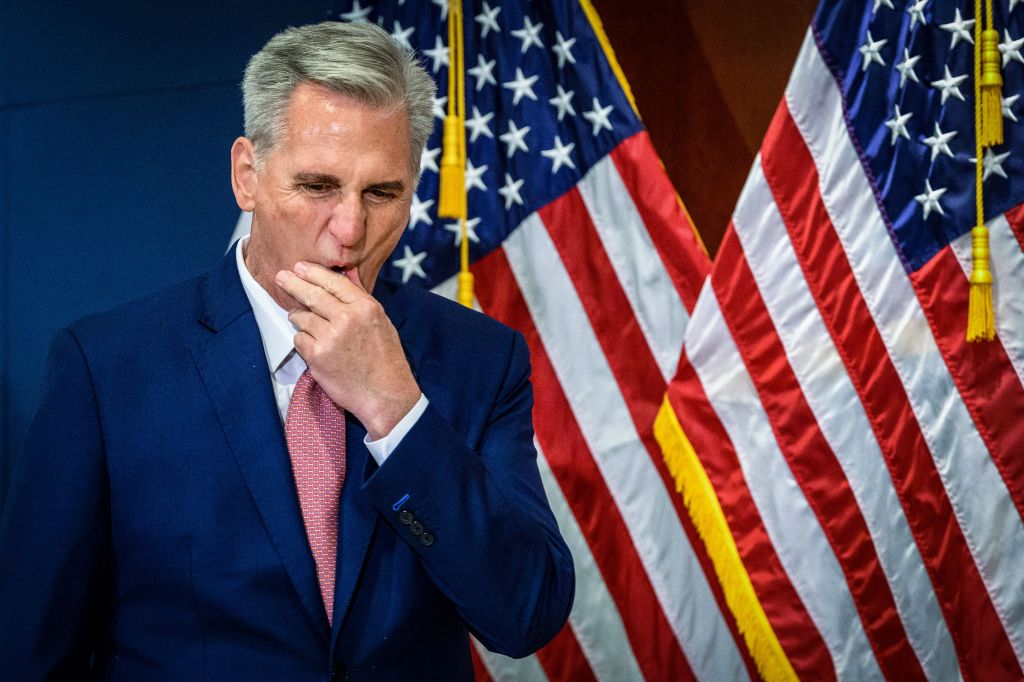California Rep. Kevin McCarthy is one step closer to becoming speaker of the House of Representatives after easily being elected leader of the chamber’s Republican conference. Yet he still has a lot of work to do.
“I’m proud to announce the era of one-party Democrat control in Washington is over,” a buoyant McCarthy told reporters Tuesday. He had just emerged from an hours-long caucus meeting in which House Republicans chose their leadership team for the 118th Congress.
McCarthy garnered 188 votes in the secret ballot contest while 31 Republicans backed his challenger, Arizona Rep. Andy Biggs. Five votes went to other candidates, according to Rep. Bob Good, a Virginia Republican.
McCarthy only needed a majority of House Republicans to support him Tuesday. In January the House will vote to install a speaker, and he’ll need a majority of the entire chamber (218 votes, unless some members are absent or vote present). That means the Californian has to win over the most hardline Republicans to secure the top spot, with little margin for disagreement given how slim the majority is expected to be. It’s likely such a feat won’t be accomplished without doling out some concessions to his most recalcitrant critics.
Rumblings against GOP leaders in both chambers came to a head as Congress returned from recess: Biggs announced his bid Monday, and Sen. Rick Scott, a Republican from Florida and chair of the Senate Republican campaign arm, said on Tuesday that he would challenge Senate Minority Leader Mitch McConnell in the Senate GOP’s leadership vote scheduled for Wednesday.
Biggs’ support mainly stems from members of the conservative House Freedom Caucus, who want to overhaul the legislative process and give more power to rank-and-file members. But not all anti-establishment members defected: Rep. Marjorie Taylor Greene of Georgia announced her support for McCarthy Monday, making the argument that if the party fractures, moderate Republicans could make overtures to Democrats to award the speakership elsewhere. As The Dispatch’s Haley Byrd Wilt covered in Uphill Tuesday, such a move isn’t outside the realm of possibility in such a tight chamber, though key moderates are publicly expressing support for McCarthy.
McCarthy and his allies have pointed out that past speakers have had factions vote against them in the run-up to the formal election. While that is true, few have had smaller majorities with which to work. In 2015, Paul Ryan won 200 votes to be nominated, while his opposition received 43 votes. But Ryan gathered 236 out of 245 GOP members in the final vote.
Rep. Tom Cole was optimistic about McCarthy’s chances in an interview with The Dispatch. “He’s in very good shape,” the Oklahoma Republican said. “He’s the indispensable guy in terms of holding this caucus together.”
While McCarthy’s race got the most attention, the conference also filled out the rest of its leadership ranks.
Louisiana Rep. Steve Scalise, who has been the Republican whip since 2014, ran unopposed for the position of majority leader, meaning he’ll work closely with McCarthy to manage the conference and the House schedule. He will assume his new role when the new Congress is sworn in on January 3.
The whip race was the most contested: It took two rounds of voting to reach a consensus. Minnesota Rep. Tom Emmer—the outgoing chair of the National Republican Congressional Committee—ultimately beat Republican Study Committee chair Rep. Jim Banks, 115-106. Emmer will become the third highest ranking member of the GOP leadership and the one most directly responsible for party discipline.
“Emmer has been there a long time,” New Jersey Rep. Jeff Van Drew—a former Democrat who switched parties during the Trump administration—said ahead of the vote. “Jim Banks has done a lot of good work and will have his time, but right now I think it’s Emmer.”
House Republican Conference Chair Elise Stefanik of New York won a second term to her current position. She faced a challenge from Florida Republican Byron Donalds, one of only a handful of black Republicans in the House. Yet she ultimately prevailed with nearly twice as much support.
In uncontested races, Rep. Mike Johnson of Louisiana will continue in his role as vice chair of the House Republican Conference, Rep. Gary Palmer of Alabama won reelection to be policy chair, and Rep. Richard Hudson will take over Emmer’s old post as NRCC chair. Rep. Lisa McClain of Michigan won a race against two others to become conference secretary.
While McCarthy and his allies are confident about his chances in January, he’s already lost at least one member. Florida Rep. Matt Gaetz has said he will oppose McCarthy no matter what. He pointed to McCarthy’s earlier attempts to become speaker.
“Kevin McCarthy couldn’t get 218 votes,” he told reporters. “To believe that Kevin McCarthy is going to be speaker, you have to believe he’s going to get votes in the next six weeks that he couldn’t get in the last six years.”






Please note that we at The Dispatch hold ourselves, our work, and our commenters to a higher standard than other places on the internet. We welcome comments that foster genuine debate or discussion—including comments critical of us or our work—but responses that include ad hominem attacks on fellow Dispatch members or are intended to stoke fear and anger may be moderated.
With your membership, you only have the ability to comment on The Morning Dispatch articles. Consider upgrading to join the conversation everywhere.